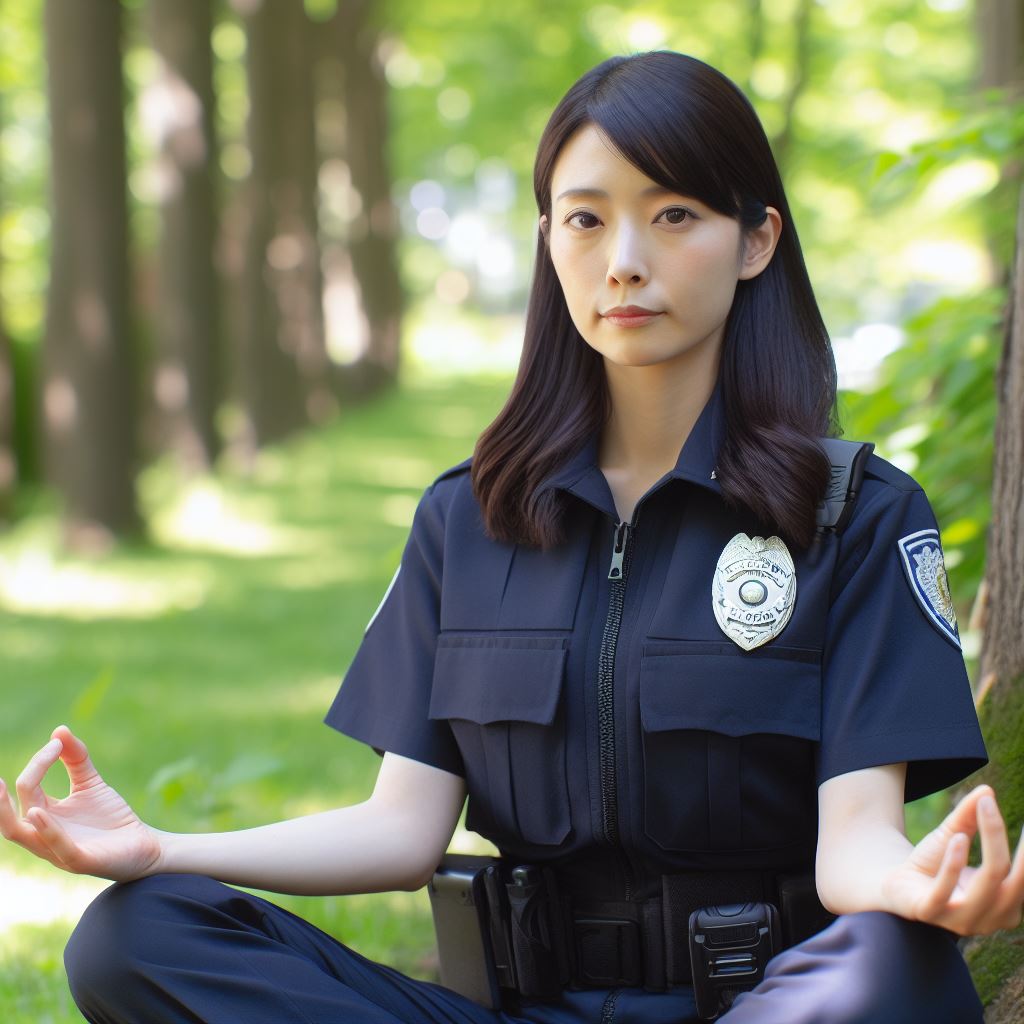Introduction
Balance is crucial for the well-being and effectiveness of police officers
Police officers are often expected to fulfill their professional duties around the clock, with little regard for their personal lives.
However, maintaining a healthy work-life balance is essential for the overall well-being of officers.
Importance of addressing the personal life and policing balance
The importance of addressing the personal life and policing balance cannot be overstated.
When officers are overwhelmed with work-related stress and neglect their personal lives, it can lead to burnout and negatively impact their mental and physical health.
This, in turn, can affect job performance and overall job satisfaction.
Moreover, officers who neglect their personal lives may face strained relationships with their loved ones, resulting in increased marital problems, isolation, and even divorce.
This not only affects their personal lives but can also have a detrimental impact on their ability to effectively serve and protect their communities.
Balancing personal life and policing is a challenge faced by many officers
By prioritizing personal life, officers can recharge and rejuvenate, which enhances their mental and emotional well-being.
Engaging in activities outside of work, such as hobbies and spending quality time with loved ones, helps officers decompress and build resilience.
This, in turn, positively impacts their job performance and effectiveness.
In addition, maintaining a balance between personal life and policing is vital for the mental, emotional, and physical well-being of officers.
It is crucial for police departments to provide support systems and resources that enable officers to manage their personal lives effectively alongside their demanding profession.
By addressing and promoting work-life balance, officers can lead healthier, more fulfilling lives while continuing to serve their communities with dedication and excellence.
Common challenges faced by police officers in balancing personal and professional lives
Long and irregular working hours
- Police officers often work extended shifts, including nights, weekends, and holidays.
- Their irregular schedules make it challenging to establish a consistent routine for personal activities and relationships.
- The long hours spent on duty can lead to exhaustion, impacting their ability to dedicate time to personal commitments.
- Moreover, these demanding working hours also prevent officers from participating in family events and special occasions.
High-stress and demanding job nature
- Policing is a high-pressure profession that constantly exposes officers to potentially dangerous situations.
- The constant need to remain vigilant and focused puts a significant strain on their mental and emotional well-being.
- The stress of making split-second decisions, dealing with conflict, and managing critical incidents takes a toll on their personal lives.
- It becomes challenging for officers to maintain a healthy work-life balance due to the intensity of their job.
Emotional toll and impact on relationships
- The nature of police work exposes officers to traumatic experiences and situations.
- Witnessing violence, accidents, and distressing events can lead to post-traumatic stress disorder (PTSD) and emotional strain.
- These emotional burdens can negatively affect officers’ relationships, making it difficult to provide emotional support to their loved ones.
- The constant exposure to danger and trauma can create a barrier between officers and their family and friends.
Difficulty disconnecting from work
- Police officers often find it challenging to separate their personal lives from their professional lives.
- Due to the nature of their job, they may bring work-related stress, concerns, or thoughts home with them.
- The constant connectivity through smartphones and other devices further blurs the line between work and personal time.
- Officers are frequently on-call and may need to respond to emergencies, limiting their ability to fully disconnect during time off.
Despite these common challenges, it is important for police officers to actively seek strategies and support to achieve a better work-life balance.
Organizational initiatives focusing on managing shift schedules, promoting mental health awareness, and providing access to counseling services can be beneficial.
Additionally, officers can prioritize self-care, engage in stress-reducing activities, and communicate openly with their loved ones about the demands of their profession.
By addressing these challenges and finding ways to manage them effectively, police officers can enhance their overall well-being and strengthen their personal relationships.
Creating a harmonious balance between personal and professional lives is crucial for their long-term success and fulfillment in both domains.
Read: Women in Detective Roles: Breaking Barriers in the US
Officer stories illustrating the struggles of balancing personal life and policing
In the world of policing, balancing personal life and the demanding nature of the job is a constant struggle.
While officers are dedicated to maintaining law and order, they often face significant challenges in maintaining a healthy work-life balance.
This section explores the stories of three officers who have experienced the difficulties and highlights the importance of finding equilibrium in their lives.
Officer Smith’s tale of missed family events and strained relationships
- Officer Smith spends countless hours on duty, often being away from his family during important events.
- Internal conflicts and guilt start to consume Officer Smith as he witnesses the toll it takes on his relationships.
Officer Smith’s tale is one that resonates with many in the law enforcement community. Spending hours on duty means being away from family during crucial events.
Anniversaries, birthdays, and holidays are often missed, causing strain on relationships. Officer Smith is plagued by internal conflicts and guilt, as he realizes the toll his dedication takes on his loved ones.
The constant battle between prioritizing work and family becomes a heavy burden to bear.
Officer Johnson’s experience of work-life imbalance leading to burnout
- Constant phone calls and the pressure to be available at all times gradually overwhelms Officer Johnson.
- Personal hobbies and interests are neglected as Officer Johnson becomes consumed by the demands of his job.
Officer Johnson’s experience sheds light on the work-life imbalance that can lead to burnout. The constant barrage of phone calls and the pressure to be available 24/7 gradually overwhelms him.
The demands of the job overshadow personal hobbies and interests that once brought joy and fulfillment.
Neglecting personal needs and an inability to disconnect leads Officer Johnson down a path towards exhaustion and detachment.
Officer Rodriguez’s personal journey of finding balance and prioritizing self-care
- Officer Rodriguez has a realization of the negative impact the job has on his personal life.
- Seeking support systems and consciously adopting self-care practices helps Officer Rodriguez find balance.
However, there is hope for officers like Officer Rodriguez, who embark on a personal journey towards finding balance and prioritizing self-care.
Officer Rodriguez comes to a realization of the detrimental impact the job has on his personal life. Recognizing the need for change, he actively seeks support systems, including therapy and mentorship.
Furthermore, he eagerly adopts self-care practices such as mindfulness, exercise, and spending quality time with loved ones.
Through these efforts, Officer Rodriguez gradually finds equilibrium and breaks free from the cycle of imbalance.
These stories highlight the pressing need for law enforcement agencies to address the issue of work-life balance.
Implementing supportive policies, such as flexible schedules and providing resources for mental health and self-care, can significantly aid officers in navigating the challenges they face.
It is essential for agencies to foster an environment that encourages open dialogue about the struggles of balancing personal and professional lives, ensuring officers feel supported and valued.
Ultimately, the stories of Officer Smith, Officer Johnson, and Officer Rodriguez serve as reminders that finding the delicate balance between personal life and policing is an ongoing journey.
It requires self-awareness, support, and a commitment to prioritizing one’s well-being.
By striving to achieve harmony in their lives, officers can truly excel not only in their careers but also in their personal relationships and overall happiness.
Read: Case Studies: Success Stories of US Detective Investigations

Strategies for balancing personal life and policing
Achieving a healthy work-life balance is vital for police officers to maintain their well-being and effectiveness. Below are some strategies that can help officers strike a balance:
Setting boundaries and establishing a clear work-life separation
- Clearly define the boundaries between work and personal life to prevent their overlap.
- Set specific times for work-related activities and make sure to stick to them.
- Avoid bringing work-related stress or issues home; leave them at the workplace.
- Communicate to colleagues and supervisors about the importance of respecting personal time.
- Make use of annual leave and other time-off benefits to recharge and spend quality time with family.
Effective time management techniques
- Prioritize tasks by importance and urgency to better manage time and reduce stress.
- Delegate responsibilities whenever possible to lighten the workload.
- Learn to say no and avoid taking on additional tasks or shifts if it will affect personal life.
- Minimize distractions during work hours to increase productivity and save time.
- Create a daily or weekly schedule to help organize tasks and allocate time for both work and personal activities.
Utilizing support systems and seeking professional help
- Stay connected with loved ones and build a strong support system for emotional and practical assistance.
- Reach out to colleagues who can relate to the challenges of balancing personal life and policing.
- Consider attending support groups or seeking counseling to manage stress and emotional well-being.
- Discuss any work-related concerns or challenges with supervisors or mentors who can provide guidance.
- Utilize employee assistance programs that may offer resources for personal and professional issues.
Incorporating self-care practices and prioritizing mental health
- Engage in regular physical exercise to reduce stress levels and improve overall well-being.
- Practice relaxation techniques such as meditation, deep breathing, or yoga to promote mental and emotional balance.
- Make time for hobbies, interests, and activities that bring joy and help to recharge.
- Find healthy outlets to manage stress, such as pursuing creative outlets or participating in sports.
- Recognize signs of mental health issues and seek professional help when needed.
By implementing these strategies, police officers can achieve a better balance between their personal lives and their demanding profession.
It is essential to prioritize self-care and mental well-being to ensure longevity and effectiveness in the field of policing.
Transform Your Career Today
Unlock a personalized career strategy that drives real results. Get tailored advice and a roadmap designed just for you.
Start NowRead: The Interplay: Detectives and the US Criminal Justice System
Tips for police administrators to support officers in achieving work-life balance
Police administrators play a crucial role in supporting officers in their pursuit of work-life balance.
By implementing certain strategies and initiatives, administrators can create an environment that promotes officer well-being while maintaining their commitment to serving and protecting the community.
Implementing flexible schedules and shifts
- Allow officers to have more control over their work hours, accommodating personal obligations and interests.
- Consider staggered shifts to provide coverage during peak times while giving officers flexibility in their schedules.
- Implement a system for officers to voluntarily swap shifts, ensuring coverage while allowing time for personal commitments.
Encouraging and promoting self-care initiatives
- Provide training and education on the importance of self-care and its impact on job performance and overall well-being.
- Encourage officers to engage in activities that promote physical and mental health, such as exercise and hobbies.
- Organize wellness programs and events that prioritize self-care, such as mindfulness workshops or access to gym facilities.
Providing resources for mental health support
- Establish partnerships with mental health professionals and organizations to offer confidential counseling services for officers.
- Train administrators to recognize signs of stress or mental health issues among officers and provide appropriate support.
- Create a culture that destigmatizes and encourages seeking help for mental health concerns.
Recognizing and rewarding officers for their dedication while encouraging balance
- Develop a comprehensive rewards and recognition program that acknowledges officers’ commitment and exceptional performance.
- Include work-life balance achievements as part of the criteria for rewards and promotions.
- Regularly express appreciation for officers’ efforts and contributions, highlighting the importance of maintaining a balanced life.
Most importantly, police administrators significantly impact officers’ work-life balance by implementing flexible schedules, promoting self-care initiatives, providing mental health support.
By prioritizing officer well-being, administrators can create a more resilient and effective police force, ultimately benefiting both the officers and the communities they serve.
Read: Understanding the CSI Effect on US Detective Work
Conclusion
Challenges faced by police officers in balancing personal life and policing.
Balancing personal life and policing presents numerous challenges such as long work hours, erratic schedules, and high levels of stress.
Officers often find it difficult to prioritize personal relationships and self-care, leading to strained family dynamics and personal dissatisfaction.
The demanding nature of the job can also result in burnout and mental health issues, further exacerbating the struggle to find a balance.
Importance of promoting work-life balance for the well-being of officers and their effectiveness on the job.
Promoting work-life balance among police officers is crucial for their well-being and overall effectiveness in their job.
When officers have a healthy work-life balance, they are better equipped to handle the demands of their profession.
By taking time to recharge and engage in personal activities, they can reduce stress levels and improve their mental and physical health.
Moreover, officers with a balanced personal life are more likely to have positive relationships outside of work, which can provide much-needed support and stability.
This support system helps to alleviate the pressures of the job and contribute to their overall satisfaction and happiness.
Additionally, maintaining a work-life balance enhances an officer’s effectiveness on the job. When they have adequate time to rest and rejuvenate, they can approach their duties with a clear and focused mind.
This has a direct impact on their decision-making abilities, attentiveness, and performance, ultimately benefiting the community they serve.
In the end, the challenges faced by police officers in balancing personal life and policing are significant.
However, the importance of promoting work-life balance for their well-being and effectiveness cannot be overstated.
It is essential for law enforcement agencies to prioritize programs and policies that support officers in achieving a healthy balance, ensuring their personal lives are not overshadowed by the demands of the job.
By supporting the well-being of police officers, we are also investing in the safety and welfare of the communities they serve.
[E-Books for Sale]
The Big Book of 500 High-Paying Jobs in America: Unlock Your Earning Potential
$19.99 • 500 High-Paying Jobs • 330 pages
Explore 500 high-paying jobs in America and learn how to boost your career, earn more, and achieve success!
See All 500 High-Paying Jobs of this E-Book
1001 Professions Without a Degree: High-Paying American Jobs You Can Start Now
$19.99 • 1001 Professions Without a Degree • 174 pages
Discover 1001 high-paying jobs without a degree! Unlock career tips, skills, and success strategies for just $19.99!




